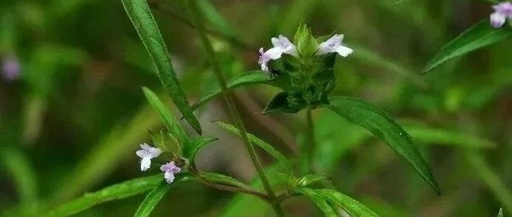Shennong tasted hundreds of herbs, each one is a medicine. For minor and major illnesses, even in cases of external injuries, herbal medicine plays an indispensable role. For instance, when bitten by a rabid dog, poisonous snake, or other harmful creatures, if one is still breathing, the juice of Qixingjian (Seven Star Sword) can be extracted and administered to save the person.
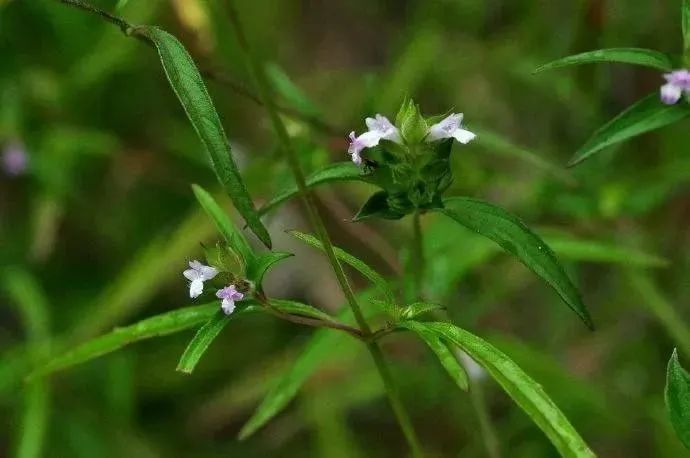
Qixingjian is the whole herb of the plant Cardamine hirsuta (also known as Wild Mustard, Small Flowered Mustard, Small Leaf Mustard, Fine Leaf Seven Star Sword).
It is an annual herb, growing 25-100 cm tall. The stem is erect, four-angled, covered with long soft hairs and fine hairs. The leaves are opposite, with ovate or ovate-lanceolate leaf blades, and finely serrated edges. The umbel inflorescence has 2 flowers, forming a terminal raceme on the main stem and side branches. The flower corolla is purple or pink, covered with short soft hairs, and the small fruit is spherical and gray-brown. The flowering period is from September to November, and the fruiting period is from October to December.
According to the “Compendium of Materia Medica”, its leaves resemble those of peach and willow. The leaves of peach are wider than those of willow, indicating that the leaves of Qixingjian are not uniform in shape, with both wide and narrow forms. The “Compendium of Materia Medica” also states: “The flowers are like pearls, and the roots, stems, flowers, and leaves all grow oppositely.” This is a beautiful and fitting description.
Qixingjian is distributed in Zhejiang, Jiangxi, Hubei, Guangdong, Guangxi, Yunnan, Guizhou, and Sichuan. The medicinal part is the whole herb, which has a strong fragrance when crushed, thus it has a pungent taste and a slightly warm nature. It enters the Liver and Spleen meridians. It can induce sweating to relieve summer heat and dispel dampness and detoxify. It is commonly used for colds, heat stroke, vomiting, diarrhea, edema, eczema, sores, and swelling, shingles, and snake bites.
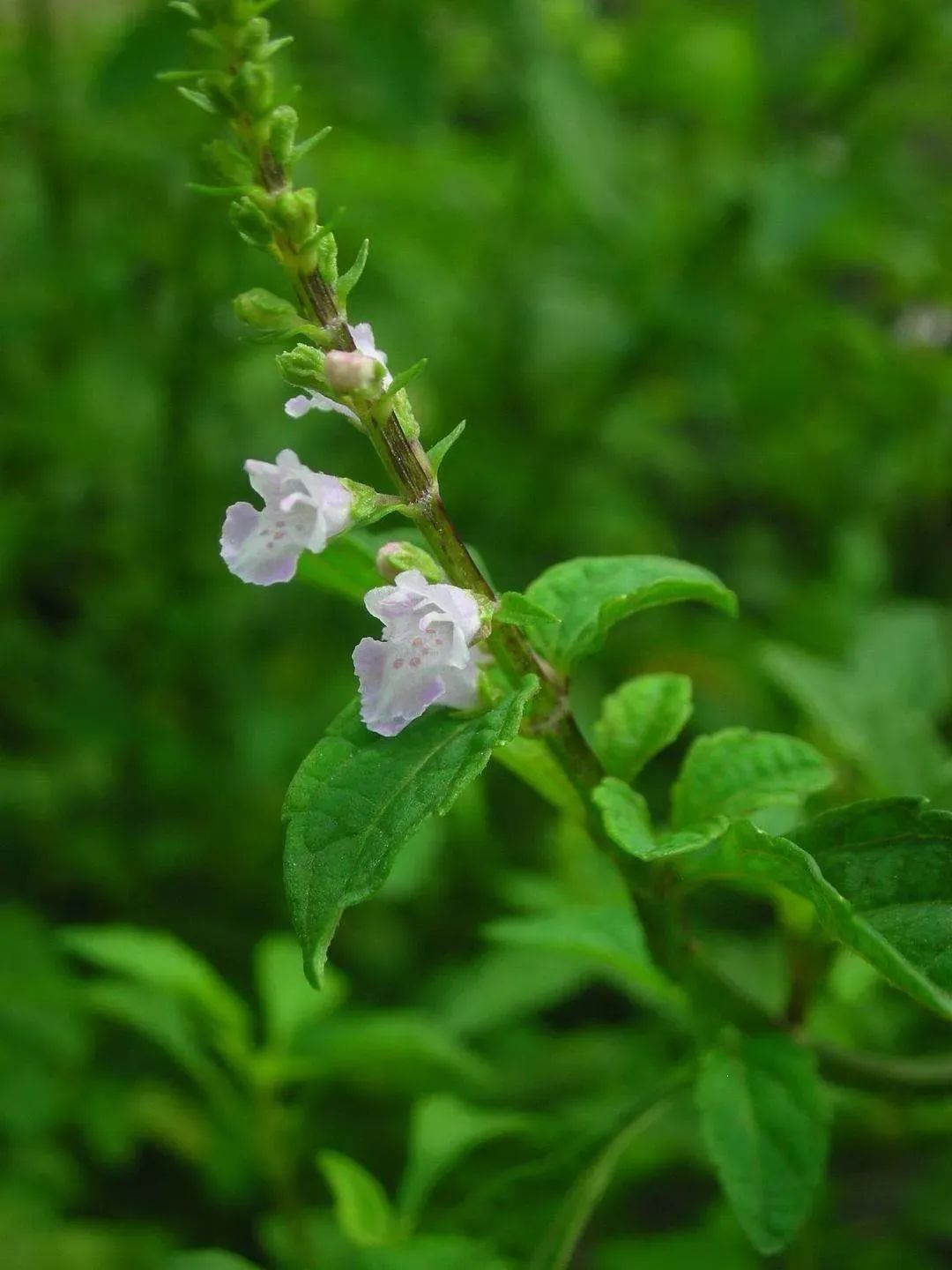
Related combinations:
1. For treating rabid dog, poisonous snake, or harmful creature bites, even if the person is still breathing: administer the juice of Qixingjian. (“Materia Medica Seeking Origins”)
2. For treating snake-like rashes all over the body that are red: cook Qixingjian with chicken. (“Record of Medicinal Herbs in Lingnan”)
3. For treating abnormal itching and pain from shingles (herpes zoster, lymphangitis, or leprosy): use an appropriate amount of Fine Leaf Qixingjian. Boil in water and wash the affected area, and also take an appropriate amount internally. (“Lingnan Herbal Medicine”)
4. For treating chronic skin eczema itching: use an appropriate amount of Qixingjian. Boil in water and wash. (“Lingnan Herbal Medicine”)
5. For treating wind phlegm sores (multiple abscesses): use an appropriate amount of Qixingjian. Mash and mix with wine, boil, cool, and apply to the affected area and take an appropriate amount internally. (“Lingnan Herbal Medicine”)
6. For treating snake bites: use fresh Wild Mustard, mash and apply externally. (“Chinese Herbal Medicine”)
7. For treating colds, heat stroke, edema, acute gastroenteritis, and indigestion: take 3-6g of Qixingjian boiled in water. (“Dictionary of Traditional Chinese Medicine”)
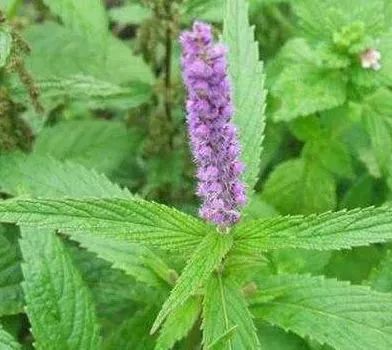
Additionally, due to the variability of the plant species, a broader range of Qixingjian not only includes Cardamine hirsuta, but also includes the whole herb or aerial parts of other Lamiaceae plants such as Jiangxiangru or Huaiqianru. Other names include Fragrant Mustard, Stone Mustard, Stone Fragrant Mustard, Fragrant Herb, Earth Fragrant Mustard, Fragrant Mustard, etc. It is mainly referred to as Fragrant Mustard. There is also a variety known as Large Leaf Fragrant Mustard, which has wider leaves than Cardamine hirsuta.
It is an erect herb with dense fibrous roots. The stem usually branches above the middle, is bluntly four-angled, has grooves, and is either hairless or covered with sparse soft hairs, often appearing straw-yellow, turning purple-brown with age. The leaves are ovate or elliptical-lanceolate (distinct from the ovate or ovate-lanceolate leaves of Fine Leaf Qixingjian), with a racemose inflorescence, slender flower stalks, nearly hairless, the calyx is bell-shaped, the corolla is pale purple, the filaments are hairless, and the anthers are purple-black.
During processing, impurities are removed, moistened with water, residual roots are removed, cut into sections, and dried.
It has a pungent taste and a slightly warm nature. It enters the Lung and Stomach meridians. It can induce sweating and relieve exterior conditions, as well as dispel summer heat and transform dampness, thus suitable for conditions caused by air conditioning and cold drinks in summer, such as aversion to cold, fever without sweating, vomiting, and diarrhea. It helps to promote Yang Qi and disperse water and strengthen the Spleen.
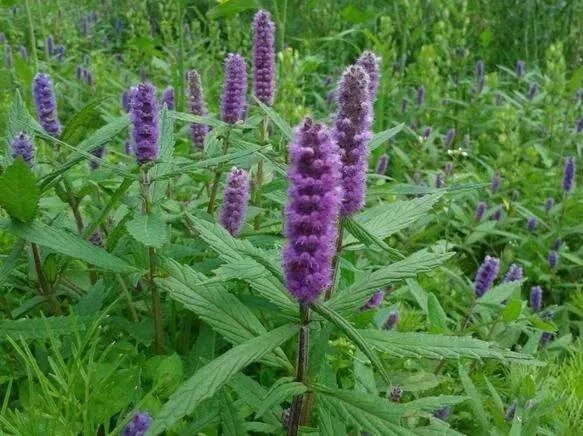
As for symptoms caused by excessive sweating, heat, and thirst due to hard labor in the sun or long-distance travel, these are not within the scope of Fragrant Mustard’s indications.
“Compendium of Materia Medica” highly praises it: “Fragrant Mustard is a medicine that harmonizes the Spleen and treats water retention. When used for heat injury, it eliminates retained water; for cholera, it calms agitation; for edema, it promotes urination. Its nature is pungent and warm, benefiting water, and can treat diseases of both upper and lower parts; it is sweet and warm, harmonizing the Spleen, and has the function of expelling turbid Qi and returning to clear Qi. Therefore, when the Lung receives it, it clears Qi and descends, not suffering from evil dryness. When the Spleen receives it, it is not troubled by dampness.”
Thus, Fragrant Mustard is also an excellent diuretic and anti-edema herb. Fine Leaf Qixingjian can also induce sweating to relieve summer heat and dispel dampness and detoxify. Both are commonly used for colds, heat stroke, vomiting, diarrhea, and edema, showing overlapping medicinal uses.
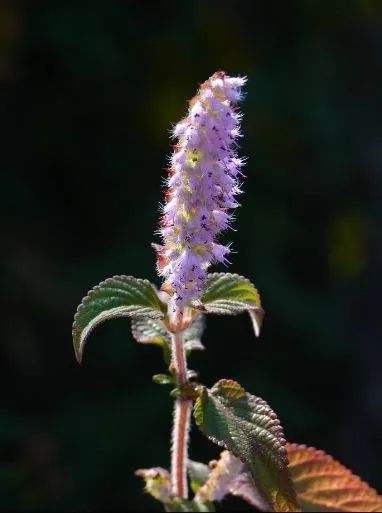
Selected formulas:
1. For treating disharmony of the Spleen and Stomach, chest fullness, internal wind-cold, external cold evil, aversion to cold with strong heat, body pain, fatigue in limbs and joints, cholera vomiting, Spleen pain, drunkenness, and seasonal cold headache:
Fragrant Mustard (remove soil) 60g, Licorice (roasted) 15g, White Flat Bean (stir-fried), Magnolia Bark (peeled, stir-fried with ginger juice), and Poria each 30g.
Crush the above herbs into a fine powder. Take 6g each time, with warm water and salt. (“Jufang” Fragrant Mustard Decoction)
White Flat Bean tonifies the Spleen and harmonizes the Stomach, Magnolia Bark descends Qi and relieves fullness, Poria strengthens the Spleen and promotes urination, roasted Licorice strengthens the Spleen and harmonizes the Stomach to relieve pain, working together with Fragrant Mustard to treat the symptoms.
2. For treating sudden bleeding on the tongue like a drilled hole: take one liter of Fragrant Mustard juice, three times a day. (“Zhouhou Fang”)
3. For treating cholera with abdominal pain and diarrhea:
Fresh Fragrant Mustard (cut) one liter, fresh garlic one liter (chopped), Magnolia Bark six taels (roasted), fresh ginger ten taels. Chop the four ingredients, boil with one dou of water, reduce to three liters, divide into three doses, and take warm to stop vomiting and diarrhea. (“Emergency Formulas” Fragrant Mustard Decoction)
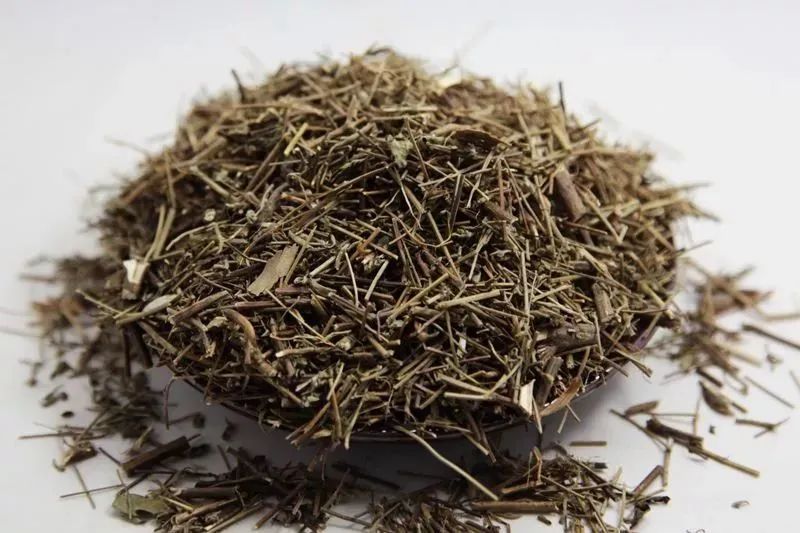
4. For treating wind-water, water retention, or water in sores, causing swelling all over:
Dry Fragrant Mustard one jin, Bai Zhu seven taels. Mash Bai Zhu and sift, boil Fragrant Mustard to extract juice, mix with Bai Zhu to form pills the size of wutong seeds. Take ten pills each time, regardless of day or night, four to five times a day, very effective for urination. In summer, using flowers and leaves together is also good. Avoid eating blue fish, seaweed, mustard greens, peaches, plums, and sparrow meat. (“Seng Shen Ji Fang” Fragrant Mustard Pill)
5. For treating cholera with vomiting and diarrhea, limbs aching, cold sweat, and excessive thirst: use two taels of Fragrant Mustard and one tael of Polygonum. Crush the two ingredients, sift. Take 6 grams each time, boil with one cup of water, reduce to seven parts, strain and take warm, three times a day. (“Sheng Ji Zong Lu” Fragrant Mustard Decoction)
Polygonum is also known as water red flower seed, which has the function of dispersing blood, eliminating accumulation, and relieving pain.
These are the medicinal uses and selected formulas of Qixingjian. Do you understand it now?
A reminder: Everyone’s body condition is different, and the formulas provided in this article should be adjusted according to individual conditions. It is recommended to seek guidance from a professional doctor. (Images from the internet, please contact for removal if there is any infringement)

Scan to follow me!



